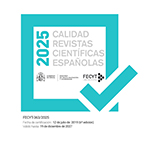Género e Interculturalidad. La coeducación desde una mirada interseccional
Resumen
Introducción. La educación pública es uno de los mecanismos institucionales más efectivos para compensar las desigualdades en todas sus manifestaciones. Las reivindicaciones ciudadanas abren paso a reformas educativas que deben adaptarse a las demandas sociales, presentes y futuras. Una escuela igualitaria no debe reparar únicamente en el género, sino también en otras categorías potencialmente discriminatorias, como la cultura o la etnia. Por este motivo, la coeducación debe contemplar en adelante una perspectiva interseccional. Objetivos. Pretendemos conocer las percepciones y creencias de docentes y de alumnado sobre prácticas coeducativas en la Educación Secundaria Obligatoria (ESO) en un contexto multicultural. Para ello, nos planteamos analizar las perspectivas de profesorado y alumnado ante prácticas coeducativas, identificar dificultades y retos en centros con un contexto multicultural; y conocer el impacto de los planes coeducativos. Metodología. Esta investigación se ha llevado a cabo desde un paradigma cualitativo, utilizando como instrumento las entrevistas semiestructuradas en profundidad, individuales y grupales, a veintiséis estudiantes y docentes de ESO de la Ciudad de Melilla. Resultados. Los resultados prueban progresos alcanzados en la coeducación, aunque también evidencian la necesidad de continuar profundizando en la formación, prevención y sensibilización para educar en igualdad. Además, demuestran la ausencia de interconexiones entre otras categorías diferentes al género, como propone la interseccionalidad, que contribuiría al logro de la igualdad real. Conclusiones y discusión. Coincidiendo con otras investigaciones similares, hacemos hincapié en la revisión de prejuicios y estereotipos culturales y religiosos, así como en una praxis efectiva de lo recogido en el proyecto educativo de centro por parte de la totalidad del cuerpo docente.
Descargas
Descarga artículo
Licencia
La revista Investigaciones Feministas, para fomentar el intercambio global del conocimiento, facilita el acceso sin restricciones a sus contenidos desde el momento de su publicación en la presente edición electrónica, y por eso es una revista de acceso abierto. Los originales publicados en esta revista son propiedad de la Universidad Complutense de Madrid y es obligatorio citar su procedencia en cualquier reproducción total o parcial. Todos los contenidos se distribuyen bajo una licencia de uso y distribución Creative Commons Reconocimiento 4.0 (CC BY 4.0). Esta circunstancia ha de hacerse constar expresamente de esta forma cuando sea necesario. Puede consultar la versión informativa y el texto legal de la licencia.











